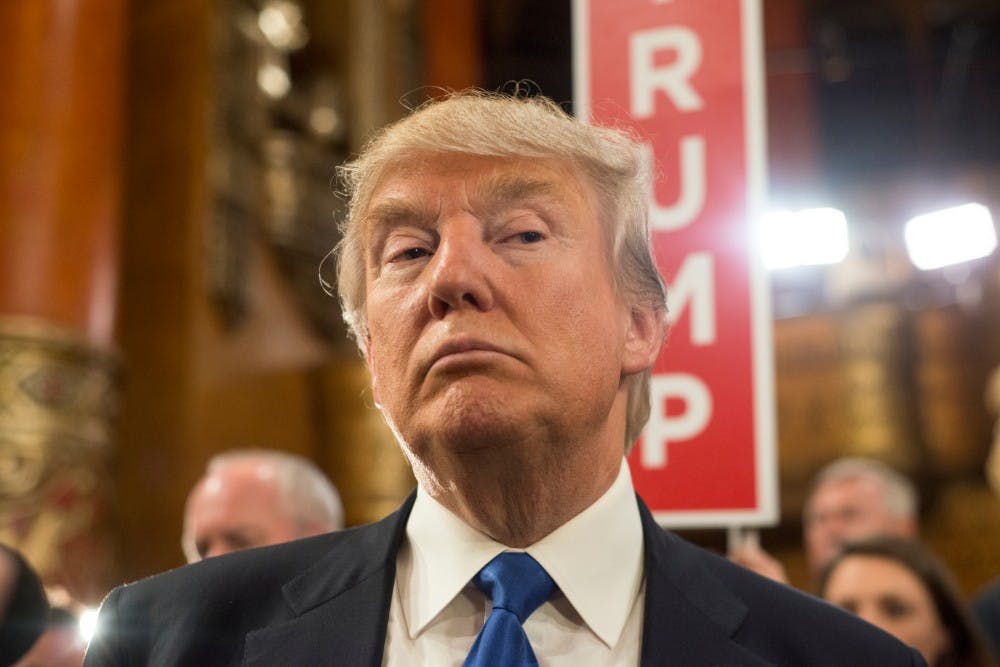The 2016 American presidential race has most certainly gone through its highs and lows. There have been major gaffes, FBI investigations and an uproar of citizens angry at their government and willing to take anybody that at least doesn't sound like a politician.
Naturally, the election has invited major passions from MSU students on the election's many issues and the characters involved. Left out of this discussion, though, are the opinions of foreign students who have more at stake with this election than most realize.
"I think this campaign cycle has been particularly interesting as an outside observer — I would probably be more concerned were I a U.S. resident," Rutger Kok, a mechanical engineering junior from Rotterdam, Netherlands, said.
Differences between how each nation handles politics and the coverage of it highlighted a divide.
"The Dutch tend to be a little more restrained and sensationalize politics a lot less than in the USA," Kok said. "This sensationalizing would be seen in Holland as largely improper and unpolitical. I can't imagine Dutch politicians ever getting into a discussion concerning something as trivial and unrelated to policy discussions as hand size," he said, referring to a comment made by Donald Trump at the March 3 Republican debate.
European students display a keen awareness of the American election for numerous reasons. Some see a similarity between the United States and the politics of their home nations, others notice the different manner as to how campaigning and media coverage of elections are conducted.
"For the election in itself, it was interesting to see the enormous size of the campaigns 'just' for primaries, and the amounts of money that it represented," Martin Lavielle, a political science and journalism junior from Lille, France, said.
As expected, the biggest talking point for many Europeans centers on the eccentric presidential run of Trump. When relaying news of the election to friends and family back home, European students will at some point be asked about the real estate mogul.
"Whenever I was discussing the election with friends or family, it was either to confirm that Donald Trump was real, or to ask for some other things not that covered back in France, like who was Bernie Sanders (I-Vt.) or who were the other Republican candidates," Lavielle said.
Beyond the voyeuristic appeal of watching Trump's antics, European students are also taking away important lessons from the similarities between American and European political shifts.
Saskia Bauer, an international relations junior from Freiburg, Germany, sees analogues between the influence of populist candidates like Sanders and Trump in the U.S. and the rise in right-wing populism in Germany and the rest of Europe.
"This is a phenomena that is not only occurring in the U.S., but also in European countries like France or Germany," Baeur said. "The French right-wing party Front National has had major success, just as the relatively new German party AfD (Alternative für Deutschland). Even though officially not sympathizing with the radical right-wing party NPD (National Democratic Party of Germany), the AfD has very similar goals. Amongst them is leaving the European Union, closing the country's borders and deporting refugees back to their countries. These goals are pretty much the same as Donald Trump's opinion."
Though it is true populism has become more prominent in both Europe and the U.S., some academics aren't as quick to equate the situations in Europe and the US as one and the same.
"It's similar in the sense that it is about a bunch of people who don't like where government is going, they're dissatisfied and they feel like they can't have an impact," Matt Zierler, associate professor of international relations, said. "But beyond that they're very different. The parties in Europe, yes they're challenging what they perceive as economic issues, but they are much more focused on race or nationality, ethnicity, and they're reacting to things that haven't been dealt with in the past."
Zierler was referring to the ongoing immigration crisis that has tested the durability of the European Union.
At the heart of this struggle is the question of who is a citizen, Zierler said. In the U.S., there is a viable path to citizenship for immigrants, not to mention its history of absorbing numerous waves of immigrants from all over the world.
For Europeans, the nature of their history and identity as Germans or Frenchmen or Dutch is complicated with the arrival of large numbers of immigrants from Turkey, Syria, North Africa and elsewhere. Add to that the problems posed by the sprawling bureaucracy of the EU and it becomes apparent how the politics of Europe and the U.S. are similar on the surface, but strikingly different the further in one goes.
One issue highlights the rise of more right-wing, populist candidates.
"People want government responsiveness," Zierler said. "They think ignoring the issues is bad for all these systems."
Support student media!
Please consider donating to The State News and help fund the future of journalism.
Discussion
Share and discuss “European students reflect on rise of Donald Trump” on social media.






